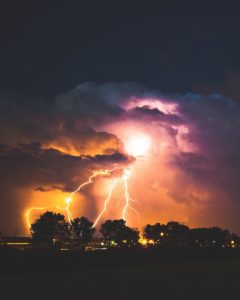 Power outages can be unpredictable and inconvenient, and they are not uncommon in Miami, Florida. The hot and humid climate in Miami can place a heavy demand on the electrical grid, and severe weather conditions, such as hurricanes, thunderstorms, and lightning, can cause power outages that last for hours or even days. In this article, we will discuss power outages in Miami and provide tips on how to prepare your home for a power outage.
Power outages can be unpredictable and inconvenient, and they are not uncommon in Miami, Florida. The hot and humid climate in Miami can place a heavy demand on the electrical grid, and severe weather conditions, such as hurricanes, thunderstorms, and lightning, can cause power outages that last for hours or even days. In this article, we will discuss power outages in Miami and provide tips on how to prepare your home for a power outage.
Power Outages in Miami
Miami is a beautiful and vibrant city, but it is also prone to severe weather conditions that can cause power outages. According to the Florida Public Service Commission, Miami-Dade County experienced the most power outages of any county in Florida in 2020, with over 266,000 customer interruptions. The most common causes of power outages in Miami are severe weather conditions, such as hurricanes, thunderstorms, and high winds.
In addition to severe weather conditions, power outages in Miami can also be caused by equipment failure, human error, and maintenance issues. While power companies work hard to restore power as quickly as possible, it’s always a good idea to be prepared for a power outage.
How to Prepare Your Home for a Power Outage
Preparing your home for a power outage can help minimize the impact and inconvenience of an unexpected loss of power. Here are some tips on how to prepare your home for a power outage:
- Create an Emergency Kit
Create an emergency kit that includes essential items such as flashlights, batteries, a first aid kit, a battery-powered radio, and non-perishable food. Make sure to store the kit in an easily accessible location, and check it regularly to ensure that the items are working and not expired. - Install Backup Power
Consider installing backup power, such as a generator or solar panels, to keep your home’s essential systems running during a power outage. Backup power can provide electricity for critical appliances such as refrigerators, medical equipment, and communication devices. - Protect Your Electronics
Protect your electronics by installing surge protectors and Uninterruptible Power Supplies (UPS). These devices can help protect your electronics from power surges and ensure that you have enough time to safely shut down your devices during a power outage. - Have a Plan for Communication
Develop a communication plan with your family and friends in case of a power outage. This plan should include how to contact each other, where to meet, and what to do in case of an emergency. - Know How to Shut Off Your Utilities
Know how to shut off your utilities, such as gas, water, and electricity. This knowledge can be essential in case of an emergency, such as a gas leak or a water main break. - Keep Your Vehicle’s Gas Tank Full
Keep your vehicle’s gas tank full, as gas stations may be without power during a power outage. This will help ensure that you have enough gas to evacuate if necessary. - Secure Your Home
Secure your home by installing storm shutters or boarding up windows in case of a severe weather event such as a hurricane. This will help protect your home from damage and keep you safe during a power outage.
Power outages can be disruptive and inconvenient, but with the right preparation, you can minimize their impact on your home and family. Miami is no stranger to power outages, but by following these tips, you can prepare your home for a power outage and ensure that you and your family are safe and comfortable.
Elcon Electric of Deerfield Beach is the trusted ally you need when it comes to restoring power after an electrical outage caused by a storm. With their exceptional expertise and experience in the electrical industry, Elcon Electric is well-equipped to handle any storm-related power restoration challenges. Their team of skilled professionals understands the urgency of the situation and works diligently to assess and repair electrical damage swiftly and efficiently. When the storm has passed and darkness looms, Elcon Electric is the reliable partner you can count on for a swift restoration of power.

